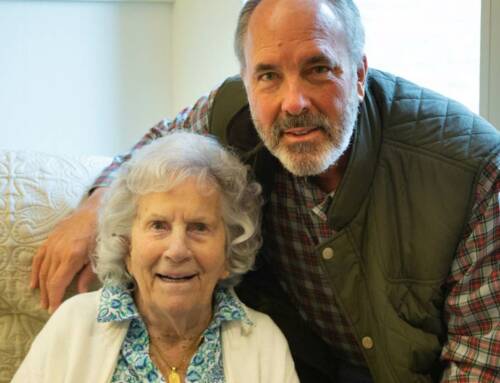A Note from Ann
Another fall semester is coming to an end. Four Elizabethtown College music therapy students are finishing their clinical experiences, and our full-time intern completed her midterm evaluation. For the past 20 years, Masonic Village music therapists have made a significant impact on residents, family members and guests’ lives, and have also supervised, coached, guided and taught hundreds of students. For high school students who “shadow” our programs, contemplating a career in music therapy, music therapy students who complete clinical placements and university affiliate interns who complete a six-month placement with us, Masonic Village Music Therapy is a tremendous educational resource.
Read on to see what our current intern, Kelsey Tucker, has to say about her experience.
Kelsey’s Story
Music therapists must complete four years of academic and clinical courses at an accredited university, then complete a 1,000-hour internship before receiving their degree. They must also take a licensing exam to qualify them for the credential of “MT-BC”– Music Therapist, Board Certified. When looking for a place to complete my internship and prepare for board certification, Masonic Village appealed to me because of its comprehensive program, unique among Continuing Care Retirement Communities.
Having the opportunity to work with five board-certified music therapists gave me a significant advantage. It meant multiple supervisors to teach, guide and evaluate me. I also saw different perspectives and observed different practice styles.
Masonic Village music therapists offer many different programs. (See “Variety is the Spice of Music Therapy – and Life”.) For an intern, these diverse programs provide opportunities for learning and growth in a more concentrated educational environment than most university clinical sites. They also provide opportunities to play many different instruments like piano, guitar and ukulele (considered the “social instruments”) or hand-held instruments like drums, tone chimes, Q-chords, xylophones, etc. The music therapists use their band and orchestra instruments as well. I have had the opportunity to play my clarinet and flute in performances and the clinical setting.
Besides performing, I am also learning documentation, which is extremely necessary to communicate with other departments and co-workers. I document attendance, outcomes and resident responses and write summary progress notes. On top of that, I have access to the Minimum Data Set or MDS, an assessment that all continuing care facilities use, and to interdisciplinary treatment plans. This hands-on approach to documentation allows interns to collaborate with other professionals and work together to meet individual resident needs. (See “The Flexibility of Music”.) All of my experiences are helping me prepare to take the certification exam, interview and enter the professional field of music therapy in continuing care.
The best part of this internship, however, cannot be expressed in academic or clinical terms. It is the relationships I am developing with residents, family members, volunteers and co-workers. I will remember the people long after my internship ends in February.
About the Author
After completing her senior year at Marywood University, Kelsey Tucker (far left) came to Masonic Village at Elizabethtown for her six-month music therapy internship. She lives in Harrisburg.




